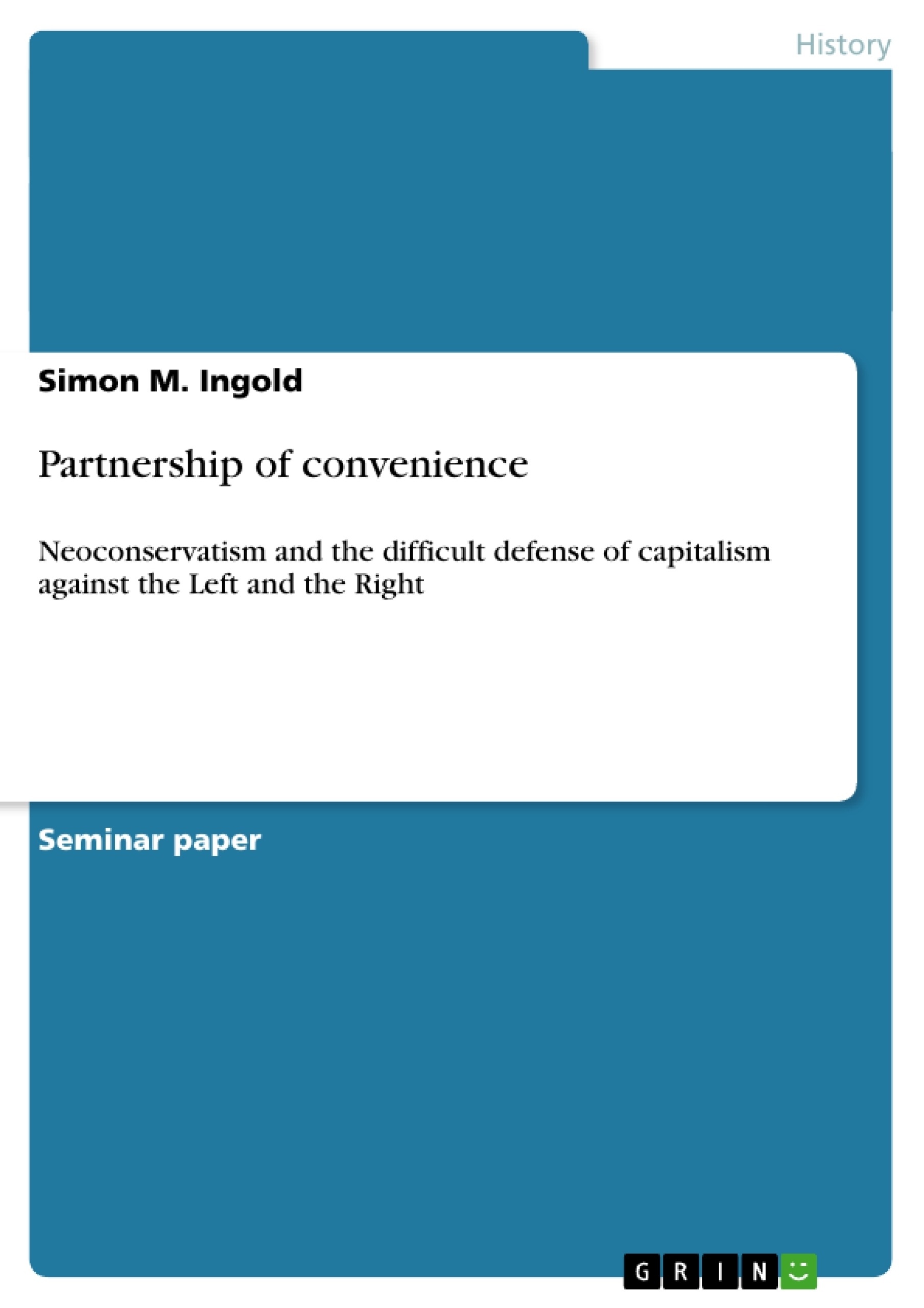We being with a brief synopsis of the salient features of neoconservative thinking. This is essential for the subsequent discussion of the neoconservative perspective on different aspects of capitalism. The chronological focus will be mainly on the 1960s and 1970s during which neoconservative ideology and radical leftist counterculture simultaneously emerged. This parallelism was critical in shaping the intellectual development of neoconservatives. Some references will also be made to the 1980s which provided an environment strikingly different from the two preceding decades.
Inhaltsverzeichnis (Table of Contents)
- Introduction
- Defining neoconservatism: origins of an intellectual ideology.
- Variants of capitalism and neoconservative philosophy.
- The liberal attack: Defending capitalism against the counterculture
- The losing battle: Saving capitalism from libertarian encroachment
- Conclusion
Zielsetzung und Themenschwerpunkte (Objectives and Key Themes)
This paper aims to examine the relationship between neoconservatism and capitalism, exploring how neoconservatism arose as a response to the political climate of the post-war period. It will also analyze how neoconservative thought addressed different aspects of capitalism, particularly in the 1960s and 1970s.
- The emergence of neoconservatism as a reaction against the liberal consensus and the "New Class."
- The impact of the counterculture movement on the development of neoconservative ideology.
- Neoconservative views on the role of government and its relationship to the market economy.
- The internal divisions within neoconservatism regarding the concrete form of capitalism.
- The neoconservative critique of both liberal and libertarian approaches to capitalism.
Zusammenfassung der Kapitel (Chapter Summaries)
- Introduction: The paper introduces the topic and outlines the complexities of analyzing the relationship between neoconservatism and capitalism. It highlights the challenges in separating myth from fact due to the emotionalized nature of the debate and the lack of a clear definition of neoconservative ideology.
- Defining neoconservatism: origins of an intellectual ideology: This chapter traces the origins of neoconservatism, emphasizing its reactionary nature as a response to the post-war liberal consensus. It explores the concept of the "New Class" and its perceived threat to social stability, and the neoconservative call for a reassertion of authority.
- Variants of capitalism and neoconservative philosophy: This chapter examines neoconservative perspectives on different aspects of capitalism. It focuses on the 1960s and 1970s, exploring the neoconservative response to the liberal attack on capitalism and the libertarian encroachment on free market principles.
Schlüsselwörter (Keywords)
Key terms and concepts explored in this paper include neoconservatism, capitalism, counterculture, New Class, liberalism, libertarianism, free market, government intervention, social stability, intellectual ideology, and political discourse.
Frequently Asked Questions
What are the origins of neoconservative ideology?
Neoconservatism emerged primarily in the 1960s and 1970s as a reaction against the liberal consensus and the perceived threat of the radical leftist counterculture.
How does neoconservatism view capitalism?
The paper describes it as a "partnership of convenience." Neoconservatives defend capitalism against countercultural attacks but also critique libertarian approaches that might undermine social stability.
What is the "New Class" mentioned in the text?
The "New Class" refers to a segment of intellectuals and professionals perceived by neoconservatives as a threat to traditional social order and authority.
What is the main difference between the 1970s and 1980s for neoconservatives?
While the 60s and 70s were defined by the struggle against the counterculture, the 1980s provided a significantly different political environment where neoconservative ideas gained more mainstream influence.
Does neoconservatism support total free-market libertarianism?
No, the ideology is internally divided. Neoconservatives often call for a reassertion of government authority to maintain social stability, which can conflict with pure libertarian encroachment.
- Arbeit zitieren
- M.A. Simon M. Ingold (Autor:in), 2006, Partnership of convenience, München, GRIN Verlag, https://www.grin.com/document/83099



